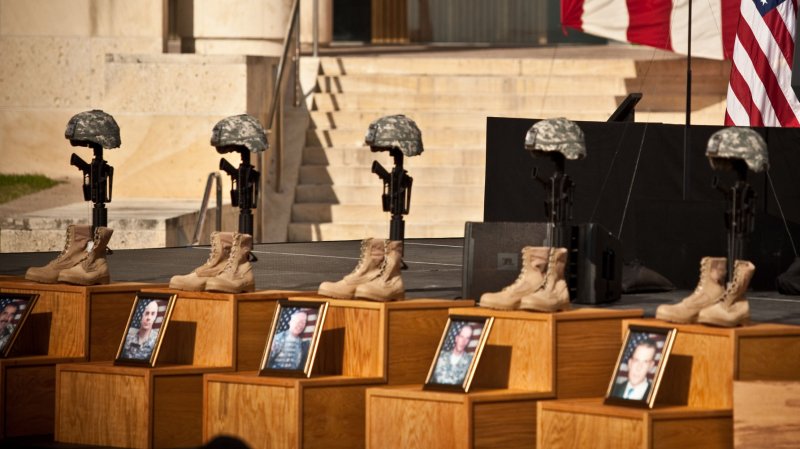Photographs of the fallen soldiers, who died in the Fort Hood shooting spree are displayed during a Memorial Service held at Fort Hood, Texas on Tuesday November 10, 2009. UPI/Erin Trieb/Pool |
License Photo
KILLEEN, Texas, Aug. 26 (UPI) -- Maj. Nidal Hasan's sentencing hearing began Monday at Fort Hood, Texas, with emotional testimony from relatives of those killed in the 2009 massacre.
The witnesses, who are not allowed to offer opinions about how they'd like Hasan sentenced, included widows of five people killed in the Nov. 5, 2009, shooting -- the largest mass murder at a military installation in U.S. history, the Killeen, Texas, Daily Herald reported Monday.
A jury of 13 senior Army officers found Hasan guilty Friday of carrying out the mass murder. The nine colonels, three lieutenant colonels and one major deliberated for about 6 hours over two days before finding Hasan, 42, guilty of 45 counts of premeditated murder and attempted premeditated murder, one count for each of the 13 people he killed and the 32 he wounded or shot at.
"I feel dead, yet alive," said Shoua Her, widow of Pfc. Kham Xiong.
At least one family member of each of the 13 killed is expected to testify during the two-day hearing, the (Austin, Texas) American- Statesman said.
Hasan has expressed no remorse for his actions. He said his only regret was being paralyzed by police officers who shot him in ending the attack.
After Friday's conviction, military judge Col. Tara Osborn told Hasan the sentencing phase would be "very complicated" and said she wanted him to approach it "with eyes wide open," KCEN said.
She advised him, as she has throughout the trial, "it would be unwise to represent yourself." But he said, as he has since firing his defense team, he would represent himself and waive his right to legal counsel.
No defendant in a military capital-punishment case has represented himself in modern times, The New York Times said.
His former defense team, which worked on his case for years, had argued to the judge Hasan was encouraging rather than fighting a death sentence. Hasan will then have an opportunity to plead in his own defense Tuesday.
He can decline to speak, make a statement under oath, which would give prosecutors a chance to cross-examine him, or make a statement without taking an oath.
The last option means he could not be cross-examined, but prosecutors could still rebut his statement.
After the prosecution rested Wednesday, Hasan presented no defense. He declined to make a closing argument Thursday.
He could become the first U.S. soldier in 52 years executed in the military's death chamber at Fort Leavenworth, Kan.
All jurors must agree on the death penalty, and President Obama must approve it. Otherwise, Hasan could receive life imprisonment.















